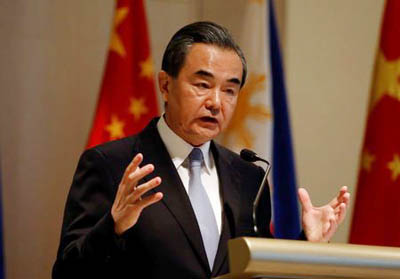
Reuters, Beijing :
Chinese Foreign Minister Wang Yi urged all parties on Thursday not to heighten tensions on the Korean peninsula and said China had already clearly condemned North Korea’s latest missile test.
“Regarding North Korea’s recent missile launch, once again in violation of UN Security Council resolutions, China has already clearly expressed our opposition,” Wang told a news conference in Beijing. “At the same time, we also call on all parties not to take any actions that will lead to an escalation in tensions,” Wang said ahead of regional meetings in Manila later this week. Pyongyang said on Saturday it had conducted another successful test of an intercontinental ballistic missile that proved its ability to strike the United States.
U.S. Secretary of State Rex Tillerson, who will also attend the ASEAN Regional Forum in Manila, is expected to press China and other countries in the region to take tougher action against North Korea.
On Tuesday, Tillerson reiterated that Washington had sought to persuade North Korea to give up its missile and nuclear weapons programs through peaceful pressure, and that it did not seek a collapse of Kim Jong Un’s regime.
Asked about those comments, Wang said China attached importance to Tillerson’s remarks about the Korean peninsula and hoped that the United States could implement them successfully. Wang said he hoped all sides could move forward together through dialogue to find a solution quickly that addresses each other’s security concerns.
Meanwhile, Turkey’s top diplomat vowed Thursday to root out militants plotting against China, signaling closer cooperation and a tougher stance against suspected Uighur militants hailing from China’s Xinjiang region who once represented a major irritant in bilateral relations.
Turkish Foreign Minister Mevlut Cavusoglu told reporters during a visit to Beijing that his government would treat threats to China’s security as threats to itself and would not allow any “anti-China activity inside Turkey or territory controlled by Turkey.”
Cavusoglu’s comments, which came after a meeting and warm handshakes with his Chinese counterpart Wang Yi, highlight the stark change in tone from Ankara in recent years regarding China’s Uighur ethnic minority, a Turkic people who share cultural and linguistic ties with Anatolian Turks.
Until recently, relations between Ankara and Beijing had been plagued by distrust largely over Turkey’s campaign to remove Syrian President Bashar al-Assad – a China ally – and its sheltering of Uighur refugees.
Human rights groups have long accused China of oppressing its roughly 10 million Uighurs with severe restrictions on language, culture and religion and inflaming a cycle of resentment and radicalization. Hundreds have died in Xinjiang in violent clashes in recent years and China now keeps the region, with a land area comparable to Iran, under a constant lockdown with massive policing and surveillance efforts that activists say are rife with abuse.
Thousands of Uighurs have fled China in recent years to seek asylum in Turkey, with many traveling on to Syria to join Islamic militant groups or simply to escape persecution and find a new home.
Chinese Foreign Minister Wang Yi urged all parties on Thursday not to heighten tensions on the Korean peninsula and said China had already clearly condemned North Korea’s latest missile test.
“Regarding North Korea’s recent missile launch, once again in violation of UN Security Council resolutions, China has already clearly expressed our opposition,” Wang told a news conference in Beijing. “At the same time, we also call on all parties not to take any actions that will lead to an escalation in tensions,” Wang said ahead of regional meetings in Manila later this week. Pyongyang said on Saturday it had conducted another successful test of an intercontinental ballistic missile that proved its ability to strike the United States.
U.S. Secretary of State Rex Tillerson, who will also attend the ASEAN Regional Forum in Manila, is expected to press China and other countries in the region to take tougher action against North Korea.
On Tuesday, Tillerson reiterated that Washington had sought to persuade North Korea to give up its missile and nuclear weapons programs through peaceful pressure, and that it did not seek a collapse of Kim Jong Un’s regime.
Asked about those comments, Wang said China attached importance to Tillerson’s remarks about the Korean peninsula and hoped that the United States could implement them successfully. Wang said he hoped all sides could move forward together through dialogue to find a solution quickly that addresses each other’s security concerns.
Meanwhile, Turkey’s top diplomat vowed Thursday to root out militants plotting against China, signaling closer cooperation and a tougher stance against suspected Uighur militants hailing from China’s Xinjiang region who once represented a major irritant in bilateral relations.
Turkish Foreign Minister Mevlut Cavusoglu told reporters during a visit to Beijing that his government would treat threats to China’s security as threats to itself and would not allow any “anti-China activity inside Turkey or territory controlled by Turkey.”
Cavusoglu’s comments, which came after a meeting and warm handshakes with his Chinese counterpart Wang Yi, highlight the stark change in tone from Ankara in recent years regarding China’s Uighur ethnic minority, a Turkic people who share cultural and linguistic ties with Anatolian Turks.
Until recently, relations between Ankara and Beijing had been plagued by distrust largely over Turkey’s campaign to remove Syrian President Bashar al-Assad – a China ally – and its sheltering of Uighur refugees.
Human rights groups have long accused China of oppressing its roughly 10 million Uighurs with severe restrictions on language, culture and religion and inflaming a cycle of resentment and radicalization. Hundreds have died in Xinjiang in violent clashes in recent years and China now keeps the region, with a land area comparable to Iran, under a constant lockdown with massive policing and surveillance efforts that activists say are rife with abuse.
Thousands of Uighurs have fled China in recent years to seek asylum in Turkey, with many traveling on to Syria to join Islamic militant groups or simply to escape persecution and find a new home.

